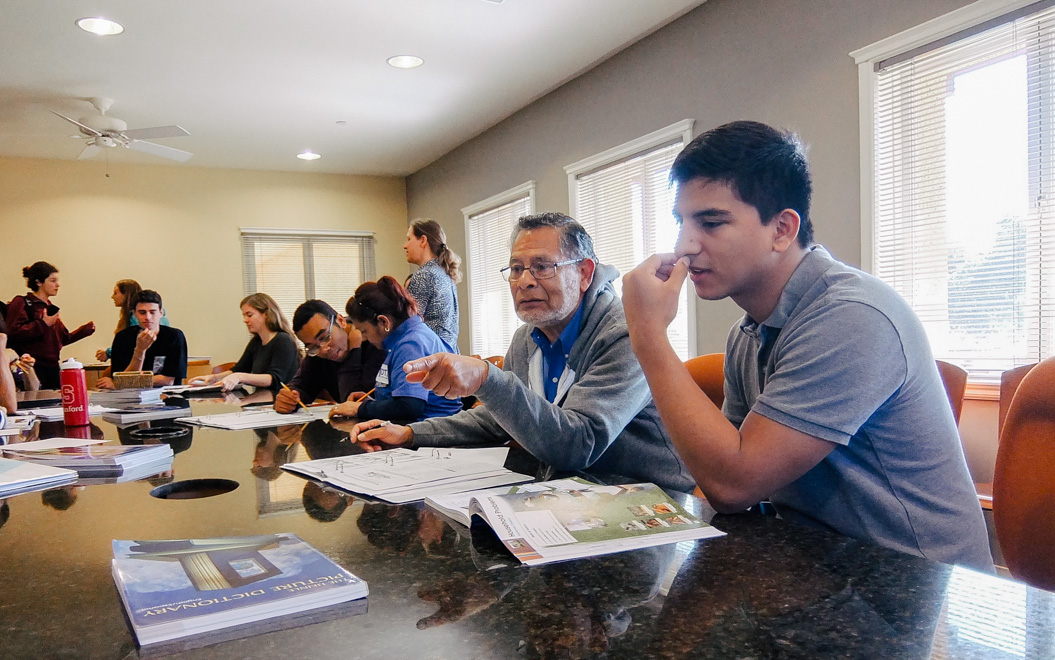This year, the Stanford ASSU Executive Cabinet has a new initiative: Staff Appreciation. Headed by Miriam Natvig ’17, the group aims to build and improve relationships between students and the workers who serve in their dining halls, clean their dorms and buildings and take care of the campus.
The Stanford community should not just be limited to students and faculty, Natvig explained.
“Staff Appreciation is sort of a response to the thought that there’s more to being at Stanford than the intellectual pursuit; we’re also trying to grow as people,” she said. “A huge part of growing as people is recognizing…the context that you live in, people who make the Stanford lives that we live possible.”
The idea for establishing Staff Appreciation came about last year when Elizabeth Woodson ‘15 and Logan Richard ‘15, this year’s executives, talked to students on campus about what was missing from the Stanford experience.
“One of the things that came up was the fact that…we talk a lot about the Stanford community, but it doesn’t really mean all of us,” Natvig said. Staff Appreciation was started to address that concern and expand the definition of “Stanford community.”
A previous executive administration in 2008-09 also had a staff appreciation initiative, but Natvig and the current iteration of Staff Appreciation are trying to address student-staff interactions in a different way.
The previous group focused on hosting parties and events for staff, Natvig said, while her group wants to find a way to integrate student-staff interactions into a more casual, everyday setting.
“We think these interactions are mainly important because of the day-to-day…and what that adds for us as a community,” she said.
Members of Staff Appreciation are encouraged by what they already see among the student population currently. At the beginning of the year the group hosted a well-attended screening of a documentary about the lives of janitorial workers.
“The room…was filled up to the brim,” said Christian Leal ’15, a member of Staff Appreciation. “It was really cool to see that a lot of people care about this issue tremendously at Stanford.”
Staff members on campus also often have positive feelings about their interactions with students. Habla, a student group, tutors workers on their lunch breaks and at night to help them learn English, giving staff and students time to talk to each other and build relationships.
Inmar Livorio, a maintenance worker who attends Habla meetings, said in a conversation translated by Fidel Salgado ’17 that he feels as if he has built meaningful relationships and gotten to know the students at tutoring sessions.
Staff Appreciation wants to do more and continue to bridge the gap between students and workers. Leal is spearheading an initiative to get houses on campus to make posters with information about their custodial staff, which he believes will increase interactions with students.
“What often happens, and we’ve looked at this, is that a lot of students…don’t ever learn the name of their custodial staff,” Leal said. “ResEd really emphasizes residential learning within the house, within the dorm, and that can happen with students, with faculty, but also with our custodial staff who have a lot to offer as well.”
Another upcoming project that Staff Appreciation is taking on gives the opportunity “for students to be able to invite a worker to lunch,” Natvig said. They can “sit down and share a meal and just talk about how they see the relationships and what they can learn from each other,” she added.
Other groups like MeCha and SALA put on similar events, such as a barbecue for staff, but Staff Appreciation wants to “take that idea and potentially make it even bigger,” Natvig said. They also want to “make it not something that workers have to go to outside of their working hours, but rather [something where] we come to where you work, to hear from you what you have to share with us,” she said.
A major driving force behind developing projects for Staff Appreciation is to make them relatively low-effort for students, Leal said.
“We want to do things that are not expensive, that are really easy to implement,” he explained.
Ultimately, Natvig hopes that the efforts of Staff Appreciation can not only expand the definition of the Stanford community but also add to the Stanford experience for both students and staff.
“Sometimes we get really fixed on…one kind of parameter at Stanford, for success. You want to get the A’s and you want to get the money, and…it has really helped me keep a good perspective on what I’m trying to do here,” Natvig said about opportunities she’s had to interact with staff through programs like Habla. “It’s not really to be rich, it’s to be a good person, and there are so many different things that go into that.”
Contact Sarah Wishingrad at swishing ‘at’ stanford.edu.
